Manufacturers Speak About Impact of Tariffs
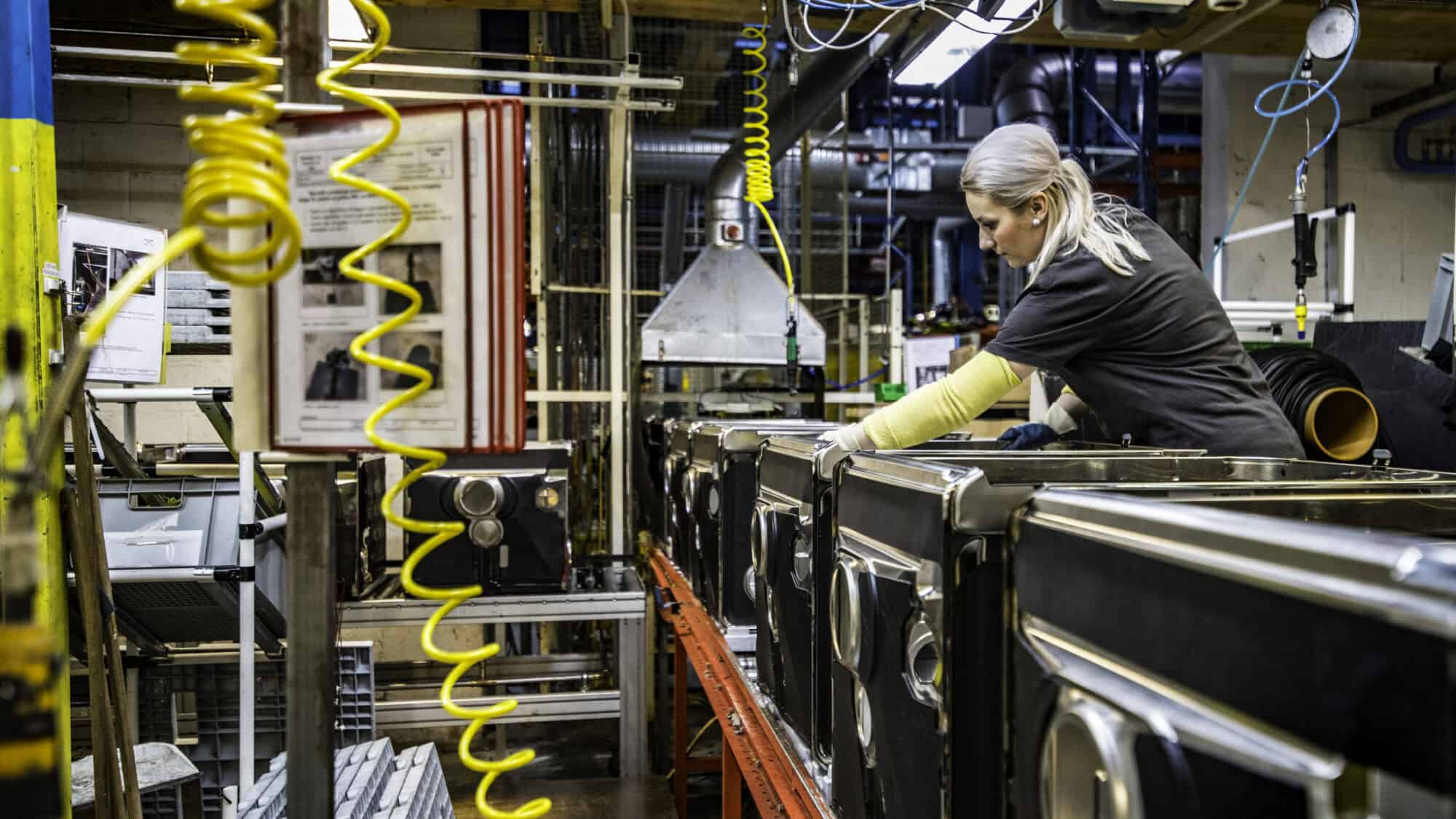
Across the country, manufacturers are telling their stories of shop floor operations under U.S. tariffs, the first of which went into effect March 13. The consensus: tariffs have made things harder all around
- Jeremy Rosenbeck is president of Cincinnati, Ohio–area manufacturer Republic Wire, Inc., which makes copper wire products for the construction industry. In anticipation of tariffs, Rosenbeck “over the winter [ordered] an extra two months’ worth of copper rod (worth tens of millions) to give him enough tariff-free raw material for his business if a new trade agreement isn’t quickly worked out” (Cincinnati Enquirer).
- Republic Wire has nearly 200 employees and each year does approximately $500 million in sales. About 10% of that is outside the U.S.
- Rosenbeck, who says he “understand[s] what they’re trying to do with the tariffs,” nonetheless told the Enquirer that spring is a bad time for uncertainty in the construction sector, as it’s when builders make their plans for the rest of the year. “Higher prices on materials could mean fewer construction projects, which could mean a slowdown for the industry, fewer jobs and a drag on the economy as a whole,” the outlet notes.
Where the burden falls: Chuck Dardas, president and chief operating officer of 67-year-old Michigan automotive manufacturing firm AlphaUSA, wrote in a recent op-ed for The Detroit News that while the Trump administration says tariffs will rebalance the scales, “the truth is that the burden falls squarely on American manufacturers and, ultimately, the American consumer.”
- For AlphaUSA, that’s because “as an S Corporation, our net income flows directly to our tax returns,” Dardas wrote. “If tariffs wipe out our income, it’s akin to a 100% income tax. There’s no profit, no reinvestment and no sustainability. This isn’t just a theoretical concern—it’s a very real possibility. If our paycheck goes to zero, how do we pay our bills? How do we reinvest in our business? How do we survive?”
- The sticker prices of vehicles are too high already, “and these tariffs will only push them higher. Inflationary pressures are mounting, and the Federal Reserve’s decision to hold off on rate changes underscores the precariousness of the situation.”
- Opposition to the tariffs, Dardas continued, “is not about politics. It’s about facts.” Manufacturers that rely on foreign imports cannot simply make the change to domestic sourcing with the flip of a switch. “[E]ven if we could pivot back to American manufacturers for … particular components, that’s not saying that they’re going to be less expensive” domestically, he said this week on radio show “All Talk with Kevin Dietz .” “They could be even more than the tariffs we could very well be faced with still buying the parts from Canada.”
“An existential threat”: If the tariffs remain in place long term, small manufacturers might not be able to hold out long enough to see their promised benefit, either, Dardas told the BBC’s “World Business Report” late last month.
- “If these go on for a long period of time, it’s an existential threat to companies our size,” he said. “We’re not that big, and there [are] a lot of us [smaller manufacturers] out here as well.”
As Tariffs Hit, Manufacturers Brace for Impact
Urge Congress to Act Now on a Comprehensive Manufacturing Strategy That Starts with Making the 2017 Tax Reforms Permanent
Washington, D.C. – National Association of Manufacturers President and CEO Jay Timmons released the following statement on the latest tariffs announced today:
“Needless to say, today’s announcement was complicated, and manufacturers are scrambling to determine the exact implications for their operations. The stakes for manufacturers could not be higher. Many manufacturers in the United States already operate with thin margins. The high costs of new tariffs threaten investment, jobs, supply chains and, in turn, America’s ability to outcompete other nations and lead as the preeminent manufacturing superpower.
“Manufacturers build things in America to sell around the world—and manufacturers in America share President Trump’s goal of supporting manufacturing investment, growth and expansion here at home. The president has the opportunity to achieve this vital goal while also minimizing disruptions and cost increases across our industry. To empower manufacturers to drive the U.S. economy, the administration should:
- minimize tariff costs for manufacturers that are investing and expanding in the U.S.;
- ensure tariff-free access to critical inputs that manufacturers use to make things in America; and
- secure better terms for manufacturers by negotiating ‘zero-for-zero’ tariffs for American-made products in our trading partners’ markets—that means they don’t charge us, and we don’t charge them.
“A clear, strategic approach to trade must be part of a comprehensive manufacturing strategy that starts with an urgent appeal to Congress to make the 2017 tax reforms permanent. When these tax cuts were signed into law, it was rocket fuel for manufacturing in America and made the U.S. economy more competitive on a global scale. Manufacturers will work with the Trump administration and Congress to advance policies that help manufacturers grow and thrive—because when manufacturing wins, America wins.”
Background: In March, the NAM released its Q1 2025 Manufacturers’ Outlook Survey, highlighting rising concerns within the industry over trade uncertainties and increasing raw material costs. Trade uncertainties surged to the top of manufacturers’ challenges, cited by 76.2% of respondents—up 20 percentage points from the last quarter of 2024 and 40 points from the third quarter. Increased raw material costs was the second most cited concern, noted by 62.3% of respondents. These trade-related pressures contributed to a slight dip in overall optimism for their companies in the first quarter of 2025, down modestly from 70.9% in the fourth quarter to 69.7%.
According to another recent NAM survey of its members regarding the impact of tariffs on manufacturers, 87% of small and medium-sized manufacturers indicated that they may need to raise prices, and one-third could slow hiring.
-NAM-
The National Association of Manufacturers is the largest manufacturing association in the United States, representing small and large manufacturers in every industrial sector and in all 50 states. Manufacturing employs nearly 13 million men and women, contributes $2.93 trillion to the U.S. economy annually and accounts for 53% of private-sector research and development. The NAM is the powerful voice of the manufacturing community and the leading advocate for a policy agenda that helps manufacturers compete in the global economy and create jobs across the United States. For more information about the NAM or to follow us on Twitter and Facebook, please visit www.nam.org.
ICYMI: NAM’s Jay Timmons Discusses Tariffs, Tax Reform, Manufacturing Investment on CNBC’s “Worldwide Exchange”
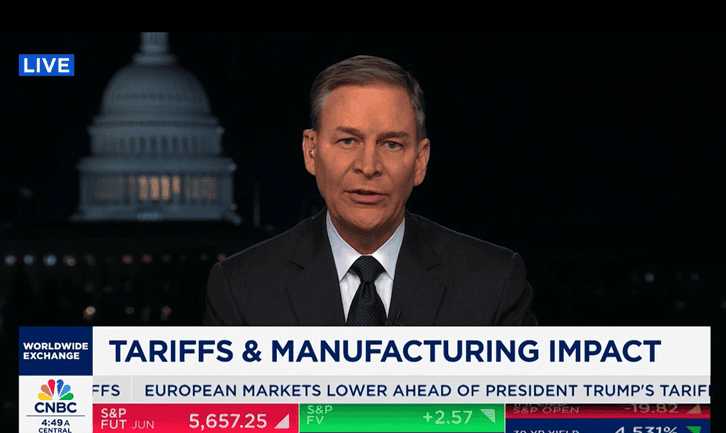
Watch Jay Timmons on “Worldwide Exchange”
Timmons on Upcoming Tariff Announcement
“We don’t know what the actual proposal is going to be, or the actual plan is going to be from the president today, but in any scenario, it’s going to add cost to manufacturers, especially for those inputs that are coming into the United States for finished goods and already finished products. So manufacturers are bracing. We’ve got 14,000 members right now who, frankly, don’t know what the future holds in terms of additional costs, and that’s why you’re seeing this type of concern and sentiment among manufacturers. In fact, three-quarters of manufacturers who we surveyed rate trade uncertainty as their number one concern right now.”
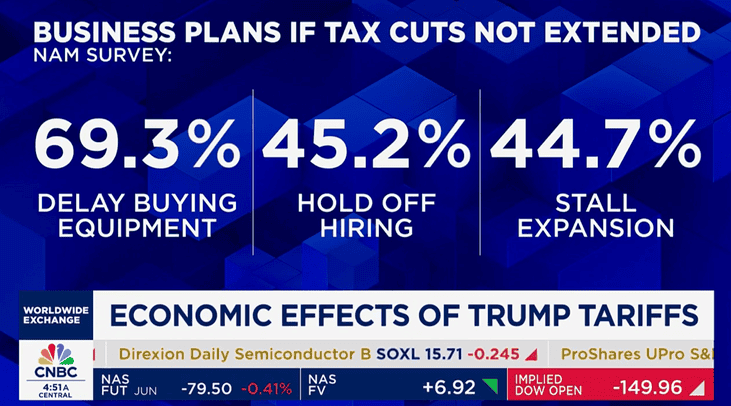
Timmons on Tax Reform, Lowering Costs for Manufacturers
“I think it’s pretty safe to say that everybody would like more things made here in this country, because that’s good for the economy. That’s good for jobs. What is not good, though, is driving up the cost of actually making those things here in the United States. So the first thing that we need … is we need to see Congress, frankly, do its job and get the tax reforms from 2017 renewed, so that … we have the certainty in the tax code. Also the administration is working on reducing the regulatory burden. That’s a lot of costs. That’s about $50,000 per employee per year for a small manufacturer. And then, of course, energy inputs and the cost of energy is important, as well as workforce challenges. We have 500,000 open jobs, for instance, in manufacturing today. So you add all that up, if we could have those advancements and those things that will bring costs down, that’s good for investment here in the United States. Adding costs for inputs, like critical minerals, for instance, really does not help us in the long term.”
…
“There was a lot of enthusiasm when the president came in and talked about strengthening manufacturing here in the United States, talked about an agenda that would lower costs. … If we don’t get the tax reforms renewed, that is an additional cost. If tariffs are imposed, that’s an additional cost. So that’s why you’re seeing consumer sentiment lower. You’re seeing the PMI index that … is now in contraction. That means that manufacturers are putting these decisions on hold. They’re waiting to see whether they should invest and hire, and that’s not good for the economy.”
-NAM-
The National Association of Manufacturers is the largest manufacturing association in the United States, representing small and large manufacturers in every industrial sector and in all 50 states. Manufacturing employs nearly 13 million men and women, contributes $2.93 trillion to the U.S. economy annually and accounts for 53% of private-sector research and development. The NAM is the powerful voice of the manufacturing community and the leading advocate for a policy agenda that helps manufacturers compete in the global economy and create jobs across the United States. For more information about the NAM or to follow us on Twitter and Facebook, please visit www.nam.org.
Timmons: Tariffs Will Add Costs for Manufacturers
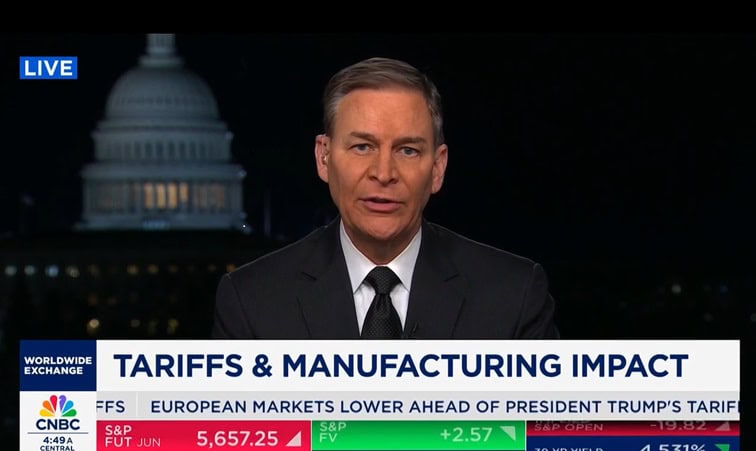
As manufacturers await the announcement of the Trump administration’s sweeping reciprocal tariffs at approximately 4:00 p.m. EDT today, NAM President and CEO Jay Timmons warned that “any scenario … is going to add cost[s] to manufacturers.”
What’s going on: Timmons, appearing on CNBC’s “Worldwide Exchange” this morning, told show anchor Frank Holland that while the world still doesn’t know what the latest tariffs will include, manufacturers are concerned—and they have good reason to be.
- Some 56% of imports to the U.S. are inputs for manufacturing, Holland said, citing NAM data. “That’s why you’re seeing this type of concern and sentiment among manufacturers,” Timmons said in response to a question about what the figure means for tariffs’ impact on the industry.
- Trade uncertainty is the top concern of the majority of manufacturers right now, Timmons said, citing the NAM’s most recent Manufacturers’ Outlook Survey. “That is up 40 percentage points over the last six months,” he told Holland. “That’s a huge jump.”
What it means: While “everybody would like more things made here in this country, because that’s good for the economy, that’s good for jobs,” new tariffs will drive “up the cost of actually making those things here in the United States,” Timmons continued.
What should be done: Manufacturers need certainty, not the nail-biting anxiety that comes from constant changes to the rules.
- “The first thing that we need to see is we need to see Congress do its job and get the tax reforms from 2017 renewed so that we have the certainty in the tax code,” said Timmons.
- Manufacturers also require relief from arduous regulatory burdens, which comes to “about $50,000 per employee per year for a small manufacturer,” Timmons told Holland, adding that the Trump administration is already working to cut those costs.
The bottom line: “There was a lot of enthusiasm when the president came in and talked about strengthening manufacturing here in the United States [and] talked about an agenda that would lower costs,” Timmons concluded.
- “But … if we don’t get the tax reforms renewed, that is an additional cost. If tariffs are imposed, that’s an additional cost. … Manufacturers … are waiting to see whether they should invest and hire. That’s not good for the economy.”
Manufacturers on the Hill Urge Action on Tax Reform Permanency
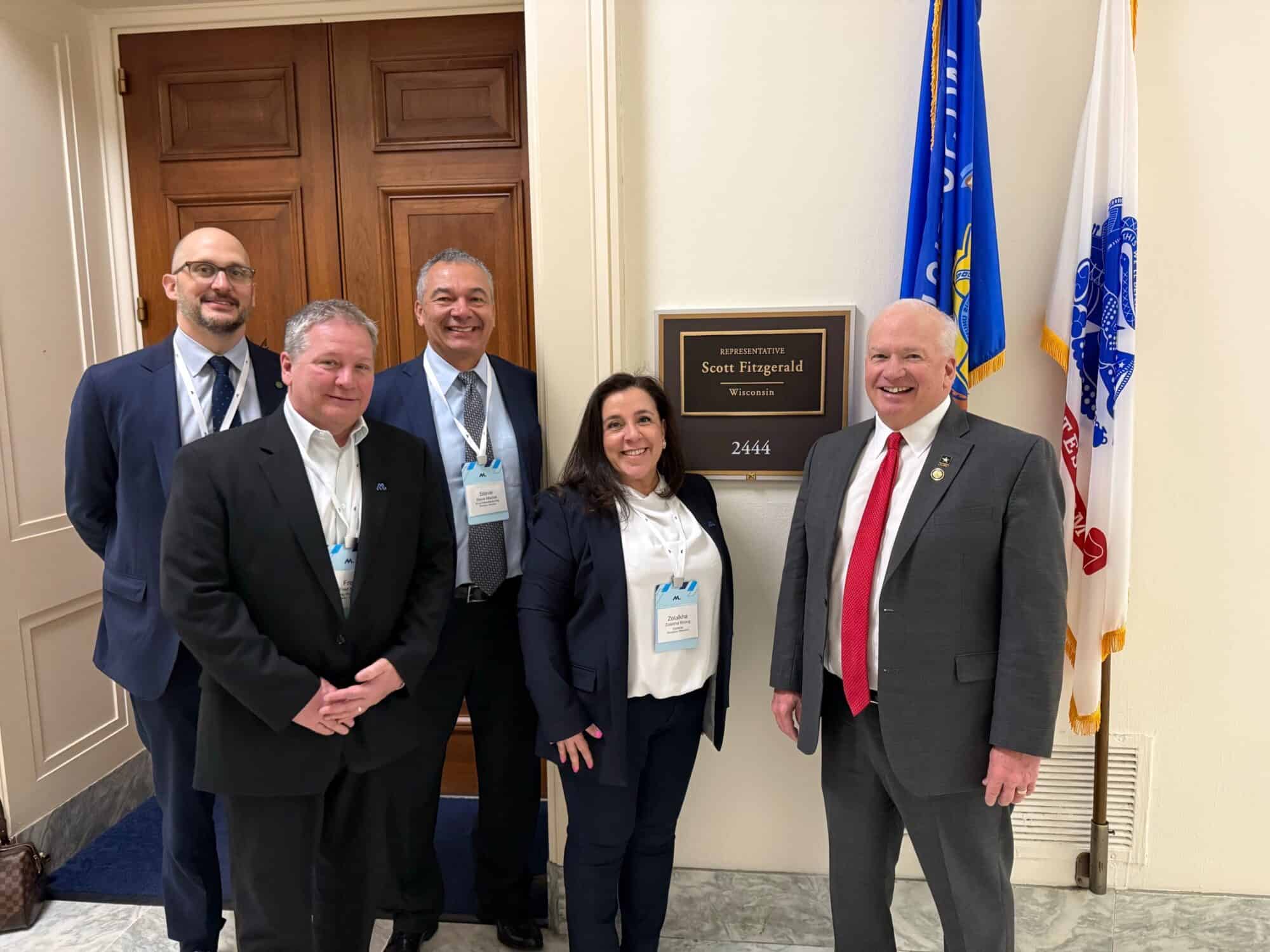
Shop floor manufacturers and NAM staff met with members of Congress yesterday and continue these meetings today on Capitol Hill to hammer home the importance of making the 2017 tax reforms permanent and getting a comprehensive reconciliation bill done now. House and Senate Republicans are working on a strategy for a tax package as part of a reconciliation bill that includes extending the 2017 Tax Cuts and Jobs Act.
- In its Morning Tax newsletter, POLITICO (subscription) reported on this week’s fly-in, naming the NAM “a powerhouse business lobby” meeting with several members of Congress as the 2025 tax bill continues to “get more intense.”
Why this is a critical moment: When the 2017 tax cuts were signed into law, “it was rocket fuel for manufacturing in America and made the U.S. economy more competitive on a global scale,” said NAM President and CEO Jay Timmons earlier this month.
- “That fuel is about to run out as key provisions have expired, and others are about to lapse. … We must ensure these historic, pro-growth manufacturing provisions are made permanent and even more competitive so manufacturers can plan, grow and succeed.”
“Exactly what the country needed”: Manufacturers traveled hundreds of miles from their shop floors to urge Congress to keep the rocket fuel for manufacturers and the American economy.
- “The Tax Cuts and Jobs Act of 2017 was huge for us,” said Tom Onsrud, CEO of the 51-year-old industrial CNC machine maker C.R. Onsrud, Inc., in Troutman, North Carolina. “It was rocket fuel. As soon as it passed, our backlog exploded. We started employing more people. We went from about 100 people to 220 people. Our floor space was maxed out. … It was exactly what the country needed.”
- One of the provisions, the immediate research and development tax credit, allowed the family-owned business to “expense equipment [costs] quickly,” Onsrud added. “That was huge for us.” That provision, however, expired in 2022.
“Vital to our company”: Stephen Bullock, president of concrete paving equipment manufacturer Power Curbers in Salisbury, North Carolina, is in Washington this week to make sure Congress knows just how important the tax reform measures have been to his small company.
- “We rely on them,” Bullock said. “We spend a lot of time and resources and money in research and development. Without [the tax provisions], it would be impossible for our company to support manufacturing. We’ve got to stay ahead of the game with new machinery, new offerings for our customers. So … anything we can do to realize those tax advantages sooner rather than later helps us very much from a cash-flow standpoint.”
- The TCJA “allowed us to expand and hire additional staff so that we [could] fund new programs, new machinery.”
“Tripled our business”: Steve Macias, co-owner of machining company Pivot Manufacturing, traveled from even farther away—Phoenix, Arizona—to make sure Congress heard what he had to say.
- “The tax reforms of 2017 … allowed us to grow our company in a way that we hadn’t [been able to] previously,” Macias told the NAM. “We were a small machine shop that did prototype and R&D work, and we’d been in business for 17 years. The tax cuts kind of gave us the kick … to take a leap and buy some production equipment, which has allowed us to virtually triple our business over the last eight years.”
- “Legislators need to understand the impact of tax reform,” Macias went on. “I’m a machine shop in Phoenix, Arizona, and there are hundreds of machine shops across the U.S., but there are also thousands upon tens of thousands of small manufacturing companies that made the same decisions we did based on those tax policies.”
Critical Minerals Executive Order Strengthens U.S. Manufacturing

President Trump’s recent executive order to accelerate permitting and access to domestic critical minerals will help manufacturing—and America—win, NAM President and CEO Jay Timmons said.
What’s going on: The recent executive order aims to boost U.S. production of critical minerals—which include lithium and cobalt—“as well as uranium, copper, potash, gold and any other element, compound or material as determined by the Chair of the National Energy Dominance Council,” according to the EO.
- China dominates the global market for critical minerals, which are vital in the manufacture of everyday goods from cell phones and computers to advanced energy and defense technologies.
- Increasing American production of these crucial substances “can create jobs, fuel prosperity and significantly reduce our reliance on foreign nations,” according to the EO. “Transportation, infrastructure, defense capabilities and the next generation of technology rely upon a secure, predictable and affordable supply of minerals.”
What’s in it: The EO—which cites “overbearing federal regulation” for the lack of American critical mineral production—enumerates “staggered timelines for agencies across government to prioritize financing for domestic mineral projects, including loans, capital and technical assistance, and calls on the Department of Defense to accelerate domestic mineral production” (POLITICO Pro’s GREENWIRE).
- It also calls on the DOD to work with the U.S. International Development Finance Corporation to offer financing for the projects.
Aligned on regulations: The NAM has long called for regulatory reform to combat the onslaught of rules coming from the federal government—and this EO is a much-needed reform, said Timmons.
- “For too long, red tape and burdensome regulations have stood in the way of the basic building blocks that power manufacturing in the United States, especially mining and processing the minerals manufacturers rely on to create jobs and dominate on the world stage,” Timmons said. “The administration is addressing those barriers, making it easier for manufacturers to access the resources we need to build the future in America.”
President’s Executive Order Strengthens U.S. Manufacturing by Accelerating Permitting and Unlocking Critical Resources
Washington, D.C. – Following President Donald Trump’s executive order to accelerate permitting and expand access to critical resources for manufacturing, National Association of Manufacturers President and CEO Jay Timmons released the following statement:
“For too long, red tape and burdensome regulations have stood in the way of the basic building blocks that power manufacturing in the United States, especially mining and processing the minerals manufacturers rely on to create jobs and dominate on the world stage. The administration is addressing those barriers, making it easier for manufacturers to access the resources we need to build the future in America.
“The NAM and our members will continue to serve as a resource to the Trump administration as it takes action to secure America’s supply chains and reduce reliance on countries like China when we have resources right here at home.
“A comprehensive manufacturing strategy—one that cements America’s position as the manufacturing superpower—depends on smart permitting reforms like the ones the administration is advancing. When manufacturers in the United States can invest with certainty, they plan, hire and win—and when manufacturers win, America wins.
“The NAM has long championed expediting the permitting process as a key pillar of our competitiveness agenda. When President Trump spoke at our September 2024 board meeting, he promised to deliver on this priority, and he has kept his promise. We look forward to continuing to work with his National Energy Dominance Council, under the leadership of Secretary of the Interior Doug Burgum and Secretary of Energy Chris Wright, to Make America Great for Manufacturing Again.”
-NAM-
The National Association of Manufacturers is the largest manufacturing association in the United States, representing small and large manufacturers in every industrial sector and in all 50 states. Manufacturing employs nearly 13 million men and women, contributes $2.93 trillion to the U.S. economy annually and accounts for 53% of private-sector research and development. The NAM is the powerful voice of the manufacturing community and the leading advocate for a policy agenda that helps manufacturers compete in the global economy and create jobs across the United States. For more information about the NAM or to follow us on Twitter and Facebook, please visit www.nam.org.
Light-Touch AI Regulation Serves Manufacturers, Consumers Best

Artificial intelligence has become integral to modern manufacturing, which is why manufacturers support the Trump administration’s goal of making America globally dominant in AI, the NAM told the White House this month.
What’s going on: “[M]anufacturers use AI in myriad ways, which has made AI integral to modern manufacturing and put manufacturers at the forefront of developing and implementing AI systems,” the NAM told White House Office of Science and Technology Policy Acting Director Michael Kratsios and AI and Crypto Czar David Sacks last Friday in response to a request for information on the development of an AI action plan.
- The NAM supports President Trump’s stated goal of “sustain[ing] and enhance[ing] America’s global AI dominance in order to promote human flourishing, economic competitiveness and national security” while also, in Vice President Vance’s words, “avoid[ing] an overly precautionary regulatory regime.”
- The NAM has been one of the foremost voices for smart regulations on AI. Last May, it published “Working Smarter: How Manufacturers Are Using Artificial Intelligence,” a first-of-its-kind AI report on AI deployment in manufacturing and an accompanying list of suggested AI-policy actions Congress and the administration should take.
What should be done: To ensure that Americans benefit from AI safely and in a manner that does not unduly hamstring innovation, four specific steps should be taken, the NAM said:
- Direct regulators to update their frameworks for the AI age: “[M]anufacturers recommend that the AI Action Plan direct federal regulators to review the statutory and regulatory frameworks they maintain and enforce”;
- Customize AI regulations: “AI is context-specific, so ‘AI regulation’ should be too”;
- Transparency between AI vendors and users: The plan should direct [the National Institute of Standards and Technology] to work with the industry to develop best practices on how vendors explain how they develop and train their AI systems, to help companies defend their use of these AI systems in front of regulators.
- “Right-size” compliance burdens: “The ubiquitous use of AI throughout modern manufacturing, as well as manufacturing’s dependence on innovation, underscore the need for rules that enable rather than hinder manufacturers’ development and adoption of AI systems.”
Other critical needs: In addition, the NAM urges the administration to prioritize the following as part of its AI action plan:
- A “dual workforce strategy”: “The AI Action plan should make enhanced access to, and support for the development of, science, technology, engineering and mathematics (STEM) education programs throughout the country, at both the K-12 and higher education levels, a national priority … and increas[e] the allowable number of advanced degree STEM graduates for employment-based visa categories, in particular among lawful permanent residents.”
- Permitting reform and existing energy generation: The plan should endorse expedited judicial review and permitting processes for energy generation projects, working “with stakeholders to identify ways that the projected increase in demand growth can be leveraged to lower the cost curve of traditional light-water [nuclear] reactors” and look closely at the role of natural gas as a source of baseload power for the data center sector.
- Privacy and security: Work “with Congress to pass a national privacy law that fully preempts the growing patchwork of state laws, protects individuals’ privacy and provides much needed legal clarity to support continued innovation and competitiveness.”
Vance: Manufacturing Will See Renaissance Under Trump

Manufacturing in the U.S. will experience a renaissance under President Trump, Vice President JD Vance said Friday in an NAM-attended speech at Vantage Plastics in Bay City, Michigan.
What’s going on: Vice President Vance—whose talk was part of the Small Business Administration’s recently announced multistate Made in America Manufacturing Initiative and Made in America Roadshow—told the crowd of employees at the plastics processing facility that America’s achievements are contingent on the achievements of its manufacturers.
- “I really do believe that America’s success depends on the success of companies like Vantage Plastics,” he said. “And I don’t mean that in some abstract, poetic-sounding sense; I mean it literally. If we do not protect our nation’s manufacturers, we lose a fundamental part of who we are as a people. Making things, building things, working with our hands is America’s heritage, and that heritage is alive and well in this facility.”
- Vantage Plastics President Paul Aultman agreed. “Imagine how much stronger this country would be if every manufacturer—large and small, in cities and towns across America—had the tools to build, expand and succeed,” Aultman said. “Manufacturing is the backbone of America, and on shop floors like ours, we’re not just making products—we’re making the future.”
Relief from the onslaught: The Trump administration intends to protect manufacturers and in doing so, touch off a gilded age for the industry—by unburdening it of the many regulations that have been heaped upon it, said Vice President Vance.
- “The Trump administration is working hard to slash regulations left and right. … We’ve got to make it easier to build stuff in our own country. We can’t have people telling our great builders that if they want to start a factory or if they want to expand a factory, they’re not allowed to,” he said, echoing longtime NAM advocacy, backed by manufacturer surveys and data. “And that is the biggest thing, I think, the Trump administration is working on when it comes to renewing American manufacturing.”
- SBA Administrator Kelly Loeffler, who spoke prior to Vice President Vance at the event, sounded a similar note, saying, “The golden era of manufacturing in America is not behind us; it’s in front of us” (Detroit Free Press).
Energy unleashed: Vice President Vance discussed the administration’s NAM-supported move last week to review dozens of burdensome Environmental Protection Agency regulations.
- “These include the Greenhouse Gas Reporting Program, which cost U.S. factories and power plants hundreds of millions of dollars,” the vice president continued. “And that money is now going to be reinvested in American workers. And we remember the Clean Power Plan 2.0, which has imperiled America’s grid by creating impossible restrictions on coal and natural gas plants that account for 60% of our power. You can’t tell people to build in America while at the same time destroying American energy.”
A new path forward: Under President Trump, American manufacturing will have room to thrive, the vice president went on.
- “We are done overregulating American businesses. We are going to be guided by a simple principle: Build in this country. We cut your taxes, we reduce your regulation and we reduce your energy costs. Build in this country. Make American manufacturing great again. And we are going to fight for you—and the president will, too.”
- “Our goal is to make it easier and more affordable to make things again in the United States of America,” he said. “If you invest in American jobs and workers and businesses, you will be rewarded. We will cut your taxes, we will slash regulations and reduce the cost of industry in this country we all love.”
The last word: “President Trump and Vice President Vance understand what manufacturing means to America—not just in economic terms, but also in human terms,” NAM President and CEO Jay Timmons said.
- “But we can only reach our full potential with the type of leadership that will make the 2017 tax reforms that were rocket fuel for the manufacturing industry permanent, rebalance the regulatory framework, expedite permitting reform to unleash American energy, grow the manufacturing workforce and implement sensible trade policies. That’s how we make America strong, prosperous and proud. That’s how we will Make America Great for Manufacturing Again.”
NAM Urges D.C. Circuit to Preserve SEC’s Ability to Regulate Proxy Firms
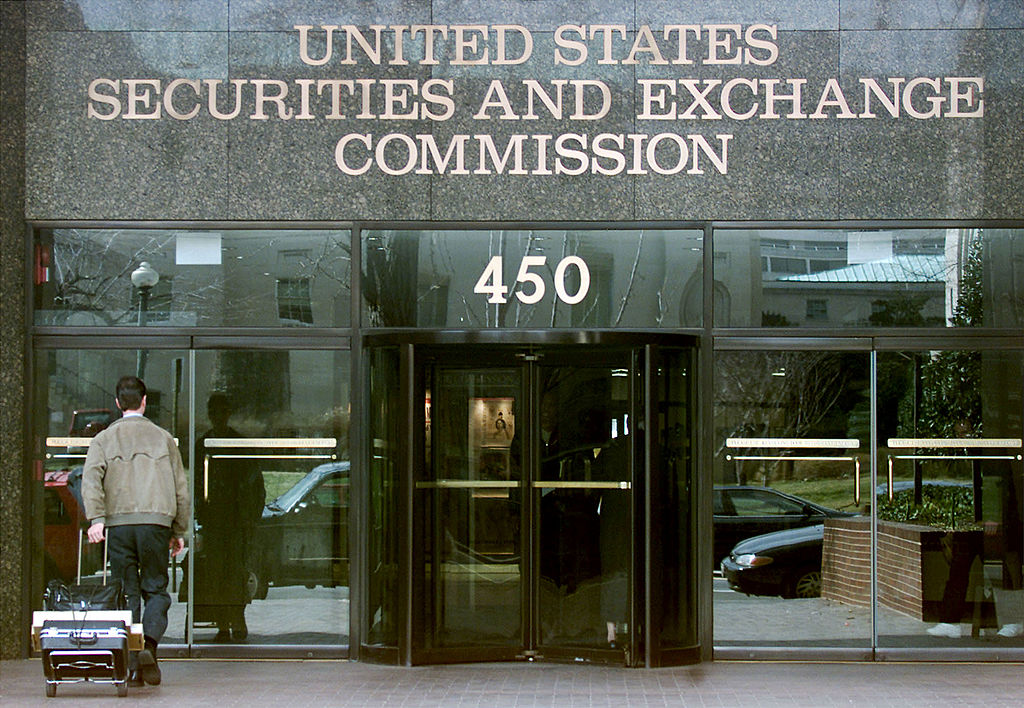
The Securities and Exchange Commission clearly has the authority to “adopt commonsense measures to protect investors” from “the most influential voices” in the proxy voting process: proxy advisory firms, the NAM’s Legal Center told the U.S. District Court of Appeals for the D.C. Circuit this week.
What’s going on: On Thursday, the NAM filed a reply brief in Institutional Shareholder Services Inc. v. Securities and Exchange Commission—a challenge, launched in 2019 by ISS, to the SEC’s statutory authority to enact critical proxy firm reforms.
- With its main competitor, Glass Lewis, ISS controls 97% of the proxy advice market and influences nearly 40% of the U.S. shareholder vote. Proxy firms are large, influential and unregulated entities that frequently dictate how shareholders should vote on proxy ballot proposals that come before public companies.
- The NAM’s brief explains that the SEC is “well within its statutory authority over the proxy process to regulate the entities that exert perhaps the greatest influence on that process” and asks the court to overturn a lower court’s ruling last February holding that the SEC lacks the authority.
- The brief is our latest move in a years-long effort to ensure reasonable oversight and regulation of proxy firms.
The background: In 2020, the SEC finalized an NAM-backed rule that put into place critical proxy firm reforms, including a requirement that the firms disclose any conflicts of interest.
- Though the NAM successfully fought across multiple pieces of litigation to preserve the 2020 rule, the SEC itself chose not to appeal the ISS case after a district court in 2024 sided with ISS in the proxy firm’s suit against the SEC.
- The NAM as intervenor-appellant has remained in the fight, making manufacturers the sole bulwark against proxy firms’ unchecked power.
- A victory for the NAM in the D.C. Circuit would make the proxy firms subject to the 2020 rule’s important reforms.
Why it’s crucial: Proxy firms “pose a real threat to Americans’ financial security,” NAM Managing Vice President of Policy Charles Crain told Congress in September.
- “Their errors and conflicts of interest put their own profits above Main Street investors’ retirement savings, their inflexible policies and refusal to engage with companies result in one-size-fits-all recommendations, their robo-voting swings investor votes in their favor and they advance ESG agendas that ignore, or even harm, shareholder value.”
